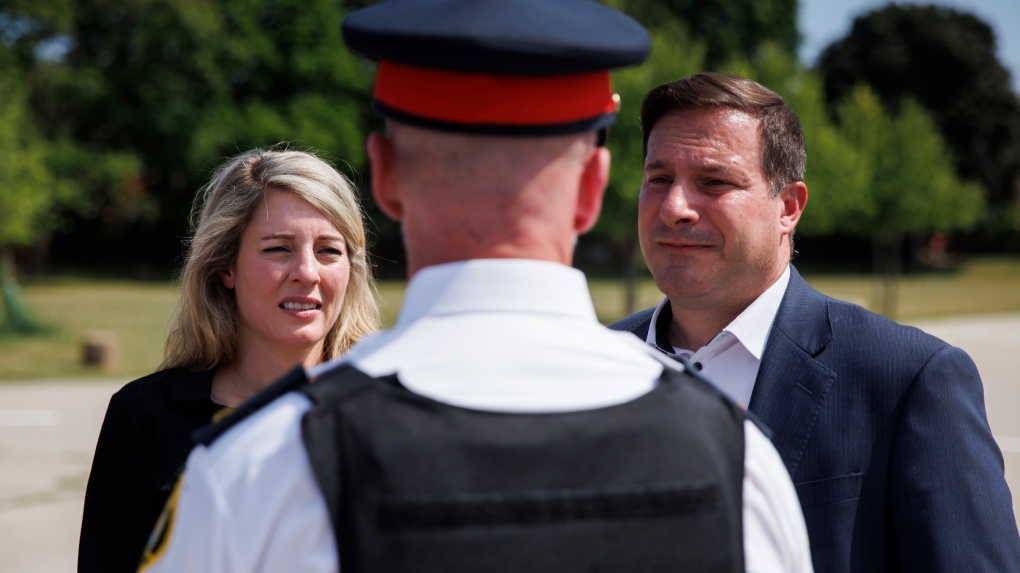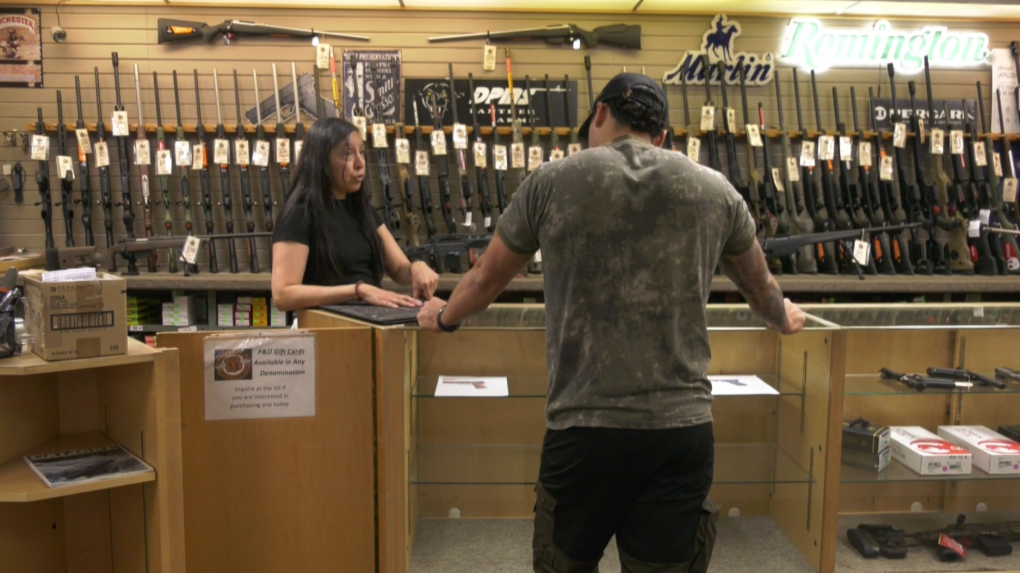Concerns emerge over 'misleading' Canadian handgun import ban
Ottawa's plan to stop handgun imports into Canada has some gun owners and experts in Alberta calling it an overreach that could have unintended consequences.
Effective Aug. 19, the Canadian government will ban the importation of restricted handguns into the country. The ban is being pushed ahead without Parliament's approval and will instead use regulatory restrictions to make the policy change.
The measure is expected to prevent "nearly all" individuals and businesses from importing handguns into Canada, the government said Friday.
"This ban is a stopgap while the handgun freeze in its entirety moves through the parliamentary process, preventing shelves from being restocked in the immediate term," said Foreign Affairs Minister Melanie Joly.
When CTV News Edmonton asked what Dianne Harnois, owner of gun store P & D Enterprises, thought about the measure, she said Prime Minister Justin Trudeau had "gone way too far."
"No matter what way he has to get it through, he is pushing it," Harnois said. "And in my personal opinion, I would tell him it is time to step down."
Doug King, Mount Royal University criminologist, says while the handgun ban may increase firearm interdictions at the border, the overall impact may not reduce gun violence on the street.
"Most firearms used in the commission of criminal events are firearms that are not owned through the proper process in Canada; they've likely been smuggled in," King told CTV News Edmonton. "You want to tackle gun violence in Canada, tackle that issue. That's where you'll get the biggest return for your investment."
King believes the government should have increased the funding to law enforcement agencies like the RCMP and Canada Border Services Agency to help recruit more officers, conduct more commercial vehicle searches, and increase the investigative and intelligence-sharing capacities of officers.
"The challenge of all this is that criminal elements are one step ahead of law enforcement, and it seems to me that public policy is always one step behind law enforcement, which is one step behind the criminal element," King added.
Another aspect that the regulator change does not consider is the ability for 3D printing of firearms, King says.
"We have to start getting our minds wrapped around the notion that I could download right now off the Internet a program to (3D) print off a firearm," he said. "They are making firearms. You and I could get ahold of that program, I think, within 30 minutes (of online searching)."
In late May, the Liberals presented Bill C-21, legislation which, if passed, would further restrict legal access to handguns. It includes a section stopping short of an outright ownership ban, instead opting for a national "freeze" on the sale or transfer of handguns in Canada that allows current owners to maintain ownership of theirs.
The proposed bill also seeks to flag to create systems that flag individuals that may pose a risk to themselves or others, and hike the maximum penalties for offences involving firearms, including smuggling and trafficking.
- What is Bill C-21? A look at the proposed firearm legislation and its implications
- National handgun freeze key feature of new firearm-control bill
UNINTENDED CONSEQUENCES
On Friday, Joly said the government decided to announce an import ban because since Bill C-21 was introduced, there was an "uptick" in gun purchases — handguns in particular.
"We want to prevent that. That is why we're announcing this import ban… We know that the vast majority of handguns in the country are imported, as there's no handgun producer in the country," Joly said.
 Minister of Foreign Affairs Melanie Joly and minister of Public Safety, Marco Mendicino, speak with Toronto Police super intendent Steve Watts of the Organized Crime Enforcement unit, following a press conference announcing new gun control laws, in Toronto, Friday, Aug. 5, 2022. THE CANADIAN PRESS/Cole Burston
Minister of Foreign Affairs Melanie Joly and minister of Public Safety, Marco Mendicino, speak with Toronto Police super intendent Steve Watts of the Organized Crime Enforcement unit, following a press conference announcing new gun control laws, in Toronto, Friday, Aug. 5, 2022. THE CANADIAN PRESS/Cole Burston
On Saturday, shelves normally containing handguns at the Edmonton store were nearly empty.
"I've been waiting for the approval to come in, which just came in the last few days," said Pat Cowman, a gun owner.
He requested his license approval last spring and was able to receive his handgun today before the store sells out.
"People are now rushing to buy a handgun," Harnois added. "Those who have a licence and can legally own one. But the long-term effects are much more severe."
 Empty shelves that normally contain handguns can be seen at P & D Enterprises in Edmonton on Saturday, Aug. 6, 2022 (CTV News Edmonton/Brandon Lynch)
Empty shelves that normally contain handguns can be seen at P & D Enterprises in Edmonton on Saturday, Aug. 6, 2022 (CTV News Edmonton/Brandon Lynch)
The legislation remains in the early stages of moving through Parliament, with MPs set to initiate a committee study of the bill once the fall sitting of the House of Commons begins in late September.
For King, that "uptick" in gun purchases should've been anticipated — especially with how much further the bill has to go to receive Royal Assent and become law.
"I think they ended up on Friday saying, 'Whoa, this thing could be delayed a whole heck of a lot longer than simply October," King said.
- Handgun sales hot in Edmonton as Kenney promises fight against federal legislation
- Trudeau 'assault-style' weapon ban 'ineffective,' says Alberta chief firearm officer
"The idea though, that banning the legitimate legal sale and transfer of handguns between law-abiding citizens of Canada and to suggest that's going to have a significant impact on gun-related violence in Canada is misleading, to say the least," he added.
King said studies have shown that those who go through the process of receiving a firearm licence in Canada, including background checks, are less likely to commit a criminal offence than someone who has not.
"There's a bit of an assumption that goes: everyone who owns a firearm is somehow closer to committing a Criminal Code offence than people who aren't," he added. "That's not true. It ultimately rests with the importation, smuggling in of illegal firearms into Canada."
With files from CTV News.ca's Rachel Aiello and CTV News Edmonton's Steven Dyer
CTVNews.ca Top Stories

Canada could impose tariffs on U.S. steel, orange juice in response to Trump threat
Canadian officials are narrowing a list of American products to target in the event the federal government must respond to U.S. tariffs on Canadian goods, CTV News has confirmed.
Convicted Jan. 6 rioter arrested as fugitive in Whistler, B.C.
An American citizen convicted of participating in the Jan. 6, 2021, riot on Capitol Hill who said he was seeking asylum in Canada has been arrested as a "fugitive from U.S. justice," according to authorities.
Can the U.S. really make Canada the 51st state?
Talk of Canada becoming the 51st American state has raised an existential question on this side of the border: Could it be done? Could the maple leaf make way to the stars and stripes? According to several experts, it may be possible, but not painless.
L.A. wildfires continue to devastate area, Canada prepared to offer expertise
A series of wildfires are searing through the Los Angeles area, forcing many to evacuate their homes. Here's everything that happened throughout Jan. 8.
'True when I said it, true today': former Canadian PM Harper pushes back against Trump on social media
Former Canadian Prime Minister Stephen Harper doesn’t find president-elect Donald Trump’s jibes about Canada becoming the 51st U.S. state very amusing.
Ontario Premier Doug Ford says he is 'OK' after OPP vehicle he was in was 'sideswiped' in Highway 401 collision
Ontario Premier Doug Ford was uninjured after an OPP vehicle he was travelling in was involved in a collision on Highway 401 earlier today.
At least 60 University of Guelph students sick as 'cluster of illness' hits residence
The University of Guelph is dealing with what they are calling a ‘cluster of illness’ among students living in residence.
Energy minister 'committed' to consumer carbon tax as he considers Liberal leadership
Energy and Natural Resources Minister Jonathan Wilkinson says he would be 'committed' to the consumer carbon tax should he become Liberal leader and prime minister, despite the policy’s unpopularity.
New ranking suggests Canada passport among 'top 5 losers' in the world
A new global ranking may raise doubts about Canada's reputation of being open to other countries.
































